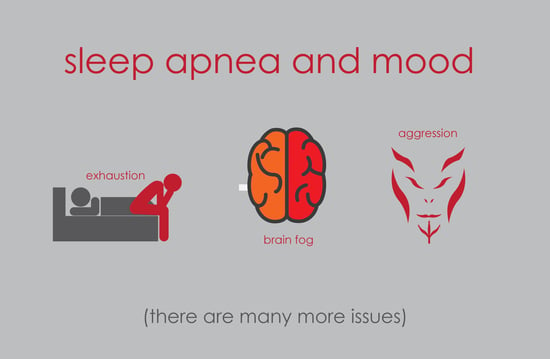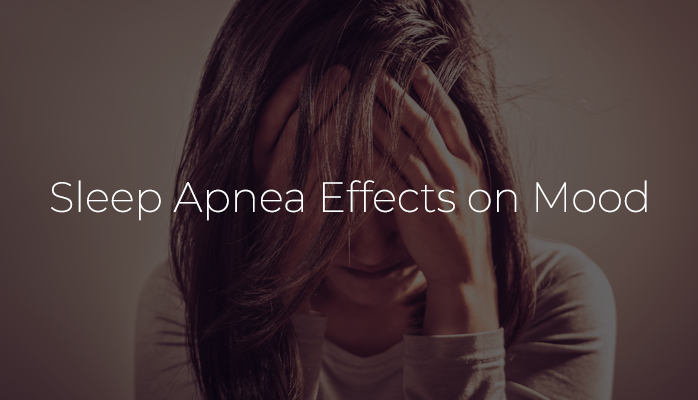What is Obstructive Sleep Apnea
Sleep apnea is a condition where your breathing repeatedly stops and starts during sleep. There are three types of sleep apnea:
- Obstructive sleep apnea
- Central sleep apnea
- Complex sleep apnea
Obstructive sleep apnea is when the upper airway becomes blocked during sleep. This blockage greatly reduces or completely stops airflow, and is usually accompanied by loud snoring.
Central sleep apnea is a type of sleep apnea that happens when the brain does not send signals needed to breathe during sleep. This type of sleep apnea is not accompanied by snoring. Sometimes, a person can have both obstructive and central sleep apnea, which is called (3) complex sleep apnea syndrome.
Obstructive sleep apnea is far more common than the other types. Continue reading to learn how OSA can affect mood.
What Causes Obstructive Sleep Apnea
Obstructive sleep apnea occurs when the back of the airway becomes blocked – i.e., there’s an “obstruction” that prevents your breathing. This obstruction can be (1) physical (anatomical features in your mouth such as tonsils) or (2) when the muscles in the back of the throat relax and close as you breathe in.
The obstruction causes sleep apnea in the following domino effect:
- You can’t get enough air, lowering the oxygen level of your blood
- This causes you to rouse briefly from sleep to open your airway
This pattern can repeat itself many times over the course of the night, destroying your ability to attain the restful phases of sleep. The physiological and medical root causes of sleep apnea include [U.S. National Library of Medicine]:
- Obesity
- Large tonsils
- Neuromuscular conditions
- Heart or kidney failure
- Genetic factors (such as cleft lip/palate, Down’s syndrome)
- Unhealthy lifestyle habits
It’s not uncommon for a person’s sleep apnea to be caused by multiple, compounding factors listed above.
How Obstructive Sleep Apnea Can Affect Mood
The main factor driving sleep apnea’s effects on your mood are the side effects of sleep deprivation. Depending on the severity of your obstructive sleep apnea, it can severely inhibit your ability to get restful sleep.
Over time, this sleep deprivation can be a major risk factor for:
- Depression [1]
- Anxiety disorders [2]
- Brain fog [3]
- Mood swings [5]
- Irritability [4]
- Impulsiveness [4]
- Aggression [4]
- Reduced sex drive [5]
- Feeling like a “different person”

The severity of the symptoms above can range from minor to significantly interfering with your marriage, relationships with friends, ability to perform at work, or stay healthy. The primary compounding factors are:
- How long you have had untreated obstructive sleep apnea
- How severe your sleep apnea is
The more severe and longer your sleep apnea goes untreated, the more severe your symptoms are likely to be.
How to Treat Sleep Apnea
For people who suffer with obstructive sleep apnea, the good news is that there are extremely effective treatment options:
- CPAP therapy (most common treatment for sleep apnea)
- Lifestyle changes
- Weight loss
Treating sleep apnea is usually pretty straightforward. CPAP therapy can be 100% effective. Making appropriate lifestyle changes can also make a big difference in the severity of your sleep apnea, such as:
- No screens (TV, phone, etc.) before bed
- Drinking less coffee
- Exercising more
- Drinking less alcohol
Additionally, persons who are obese or overweight may significantly reduce the severity of their sleep apnea by losing weight. A diagnoses starts with a sleep study or consultation with a sleep doctor.
Get a help for obstructive sleep apnea now
Citations
[1] "Sleep Disordered Breathing and Depression among U.S. Adults: National Health and Nutrition Examination Survey, 2005-2008," SLEEP.
[2]Kimberly A. Babson, A.C. Del Re, Marcel O. Bonn-Miller, Steven Woodward. The comorbidity of sleep apnea and mood, anxiety, and substance use disorders among obese military veterans within the Veterans Health Administration. Journal of Clinical Sleep Medicine, 14, 8.
[3] Bumhee Park, Jose A. Palomares, Mary A. Woo, Daniel W. Kang, Paul M. Macey, Frisca L. Yan-Go, Ronald M. Harper and Rajesh Kumar. Aberrant Insular Functional Network Integrity in Patients with Obstructive Sleep Apnea.Sleep, 39, 5, (989), (2016).
[4] Anne Dominique Bartolucci. Effects of sleep deprivation, irritability, and negative affect on aggression, University of Georgia, 2005.
[5] Ohayon M, author. The effects of breathing-related sleep disorders on mood disturbances in the general population. J Clin Psychiatry. 2003;64:1195–200. [PubMed]

